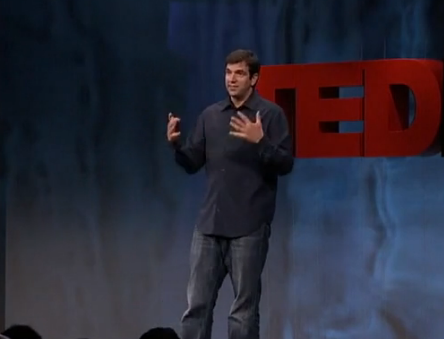And the second point I want to make, the final point, is that -- and it's actually been a theme of TEDMED
我想说的第二点,也是最后一点,实际上就是TEDMED的主题--
that joy is so important to your health, that very few of these behaviors will stick with me unless there's some sense of pleasure and joy in them.
快乐对人的健康非常重要,要不是这些行为可以带给我快乐和愉悦的感觉,我很难能坚持下来。
And just to give you one instance of this: food.
举一个例子:食物。
The junk food industry is really great at pressing our pleasure buttons and figuring out what's the most pleasurable.
垃圾食品行业特别擅长开启我们的愉悦感,并带给我们最快乐的感受。
But I think we can use their techniques and apply them to healthy food.
但是我想我们可以将他们的技术应用到健康食品领域。

To give just one example, we love crunchiness, mouthfeel.
比如说,我们喜欢脆脆的口感。
So I basically have tried to incorporate crunchiness into a lot of my recipes -- throw in some sunflower seeds.
于是我试着把这种脆脆的口感加入到我的许多食谱中--比如放一些葵花籽进去。
And you can almost trick yourself into thinking you're eating Doritos.
你就会有像吃多力多滋一样的口感。
And it has made me a healthier person.
这使我变得更健康。
So that is it. The book about it comes out in April. It's called "Drop Dead Healthy."
就是这些。这本书四月面世。书名叫做“不要盲目追求健康”。
And I hope that I don't get sick during the book tour.
我希望新书宣传的时候我不要病倒。
That's my greatest hope. So thank you very much.
这是我最大的愿望。非常感谢大家。












